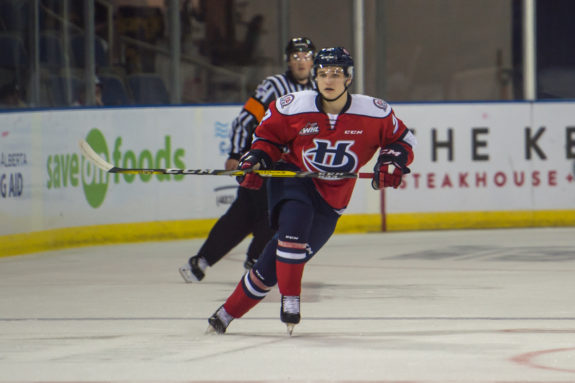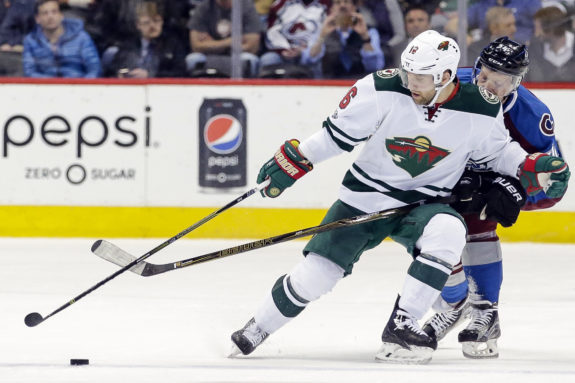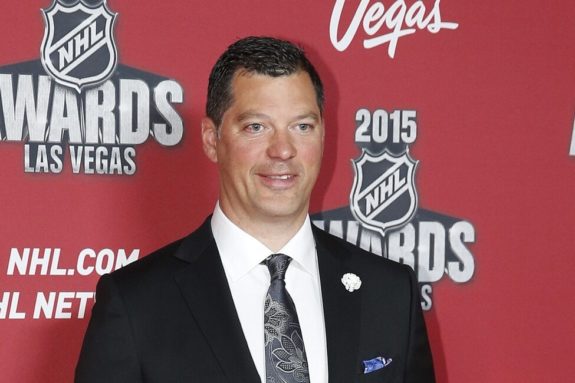General manager Bill Guerin certainly got the Minnesota Wild’s money back and then some by trading forward Jason Zucker, a second-round pick back in the day. That’s the way Wild fans have to look at Zucker, because otherwise it’s hard to see it as a win.
Zucker to the Penguins
In Zucker, the Wild have given the Pittsburgh Penguins an in-his-prime perennial 20-goal scorer with three seasons left on his deal. Coming back the other way are a pending unrestricted free agent in Alex Galchenyuk, a defensive prospect in Calen Addison and a 2020 first-round pick (that can be moved to 2021 by the Pens, if they miss the playoffs).

That conditional first-round pick, as much it is likely the centerpiece of the deal for the Wild, sums it all up perfectly. Whereas the Wild gave up a tangible asset in Zucker, there is no certainty here. For example, Calen Addison may have significant upside, but, until he reaches the NHL, no one knows for sure.
Similarly, Galchenyuk may have found success in the past, but he should be considered little more than a big contract coming the Wild’s way to get the deal done, as he has just five goals when once he had scored 30. Even if Galchenyuk is able to magically rekindle some semblance of his scoring ability, there are no guarantees he stays past this season.
Zucker Far from Expendable
In that sense, you’d have to have thought Wild captain Mikko Koivu, who’s also a pending unrestricted free agent, would have been more of an ideal trade chip. Granted, Koivu is not the player he once was (and he has a no-movement clause), but the point is there are other players on the Wild who should have been considered more expendable than Zucker.

That’s of course if you ignore how Zucker has been the center of trade rumors for a while now. There had been noise he was going to be traded to the Calgary Flames, but that fell through, thankfully for the Wild due to the underwhelming reported return (Michael Frolik and a pick).
Zucker had also been linked to the Penguins before in a hypothetical trade revolving around him and Phil Kessel. To Guerin’s predecessor Paul Fenton’s credit, that potential deal actually made a great deal of sense. Conveniently ignoring the fact Kessel is well off his career norms this season with the Arizona Coyotes, he’s a theoretical threat to score 30 goals every season, as he has accomplished the feat six times in his career to Zucker’s one.
This Is Guerin’s Team Now
Nevertheless, that trade would have been more beneficial to the Wild when they still had hopes of making noise in the playoffs (or even making them). Pretty much the start of the season, before they started 1-6, then. So, considering the circumstances, Guerin has Fenton beat (in more ways than the one). For the Wild’s purposes, a theoretical rebuild in other words, Guerin did a great job here. The only issue is whether or not he needed to make the trade in the first place.

Yes, this is Guerin’s team and he has every right to leave his stamp on it. And there may have even been signs Zucker was on the outs with head coach Bruce Boudreau, dating back to early in the season when Zucker called out the entire team, including the latter.
Still, you have to question Guerin’s wisdom here if he is in fact siding with his head coach. After all, Boudreau is on every conceivable media outlet’s hot seat, having suffered diminishing returns in the standings every season he’s been behind the bench.
Guerin inherited Boudreau, so there’s a good chance he isn’t even “his guy.” The same may be said about Zucker, but he’s still a proven commodity who is likely to continue to find success, especially now that he’s going to the powerhouse Penguins. As a former second-round pick (2010), it’s safe to say he’s panned out… even exceeded expectations.
The Wild should be so lucky with even one of the assets they picked up in the deal, like Addison (2018), who’s a former second-round pick in his own right. If they are, this turns into a success for the Wild, which begs the question: Why make this trade in the first place? That’s a big if.